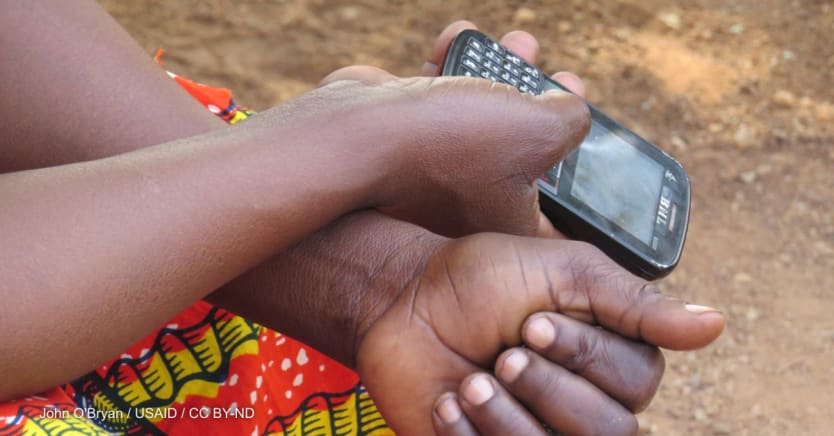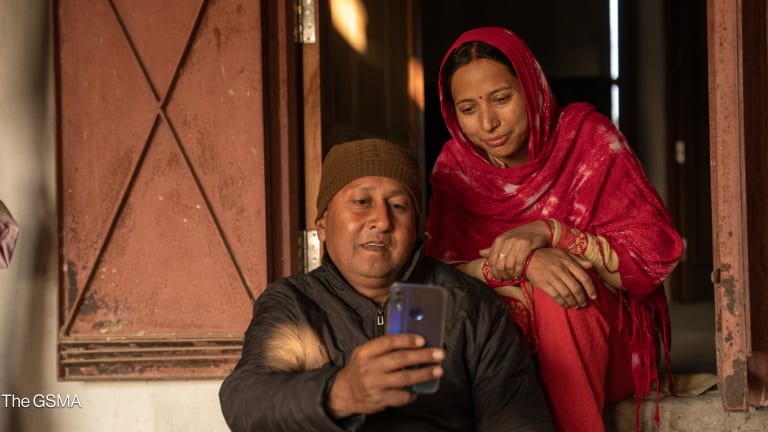
In the early days of the COVID-19 pandemic, the story of Namitha Narayanan in Kerala, India, went viral after she climbed on the roof of her parents’ house to reach a mobile data signal with enough stability for her college classes online.
People read this story as one of hope, showcasing the student’s tenacity and ingenuity to overcome barriers to pursuing her education. But it was also a story of tragedy. She was one of billions of young people around the world without the internet access they need to learn, earn, and follow their ambitions.
Nearly half of the world’s population still has no access to even a basic internet connection. Across Africa, this figure is closer to 70%. And women are disproportionately excluded. “Men remain 21% more likely to be online than women, rising to 52% in the world’s least developed countries,” according to the World Wide Web Foundation.
The costs of not being connected have escalated as the internet has become the route to so many of life’s opportunities, from finding work and accessing services to learning skills and building community. And the COVID-19 crisis heightened the costs of exclusion like never before. Across the world, without the option to move online, dreams were put on hold. Education halted. Businesses closed. The pandemic reinforced the impacts of the existing digital gender gap.
This divide, already known to those who care about women’s equality, should be just as concerning to anyone who cares about economic prosperity more broadly. Because gender inequality, wherever it lies, is an eye-wateringly expensive problem.
New research from the Alliance for Affordable Internet, or A4AI, and the Web Foundation shows just how great the economic cost of the digital gender gap and the opportunity governments have to boost economic growth if they take action.
Measuring how much the gender divide has impacted gross domestic product in 32 low- and middle-income countries, the research finds that these economies have lost out on an estimated $1 trillion in the past 10 years. The amount these countries have lost over a decade is equivalent to almost two-thirds of the combined annual GDP of sub-Saharan Africa.
This economic hit has a direct impact on governments, with the report estimating these governments are missing out on $25 billion in tax revenue each year as a result of lost productivity. This is funding sorely needed to pay for schools, hospitals, and COVID-19 recovery strategies. It’s enough to cover 5 billion AstraZeneca jabs.
Governments have a choice to make. Without a course correction, the report estimates this lost GDP will climb to $1.5 trillion by 2025. That means there’s a $500 billion-plus opportunity on the table for governments who take action.
Political leaders should make digital gender equality a priority to help build a resilient economy as part of their COVID-19 recovery plans. This will help to create economic growth but also create healthier societies by addressing other gender inequalities — in education, political leadership, and earning power. All things they’ve committed to do as part of the Sustainable Development Goals.
How then can they course correct and ensure all women are able to use technology and take part fully in the digital revolution?
Part of the solution is financial. Investment in ICT infrastructure is needed to make sure stable, high-speed internet access is available and affordable to everyone, recognizing that women often have less spending power. A4AI has estimated that an additional investment of $428 billion over 10 years is needed to reach universal internet access by 2030, globally. These investments will pay for themselves many times over.
But an effective approach has to go beyond infrastructure. Various factors prevent women and girls from accessing the internet and participating online, including barriers to education and building digital skills, social pressure discouraging women and girls from owning handsets, unequal access to identification, and fears around privacy, safety and security — not to mention the pandemic of online abuse facing women around the world.
So we need a more holistic approach, including a range of programs and policies that take into account the social, economic, and cultural context in each country.
We have developed a comprehensive digital economy framework that tackles the digital gender divide on a number of fronts, from broadband access to digital financial inclusion, digital ID, and digital skills, to cybersecurity and online safety. This approach is in line with the Web Foundation’s REACT framework — or Rights, Education, Access, Content, Targets — designed to help focus the minds of policymakers on key areas they need to address to make sure women can fully participate online.
Political leaders should make digital gender equality a priority to help build a resilient economy as part of their COVID-19 recovery plans.
—The rights pillar, for instance, includes challenging gender norms that discourage women owning devices. Targets means ensuring policies have specific benchmarks on expanding internet access for women and girls — something few governments have done to date.
The education pillar says policy must focus on embedding digital skills training in curricula and eliminating gaps in school attendance between boys and girls. In sub-Saharan Africa there are still 123 girls out of primary school for every 100 boys. These policies will complement existing initiatives like the digital skills pilot program the World Bank launched with the EQUALS Global Partnership this year to support over 500 women and girls in Rwanda, Nigeria, and Uganda.
A failure to close the digital gender gap would not only fail women who remain unconnected, but everyone who would miss out on the ideas, business, culture and prosperity that would result.
In Kerala, Narayanan continues her studies, now with the benefit of high-speed internet access. Let’s make sure that the next generation of girls don’t have to scale rooftops to pursue their ambitions.








